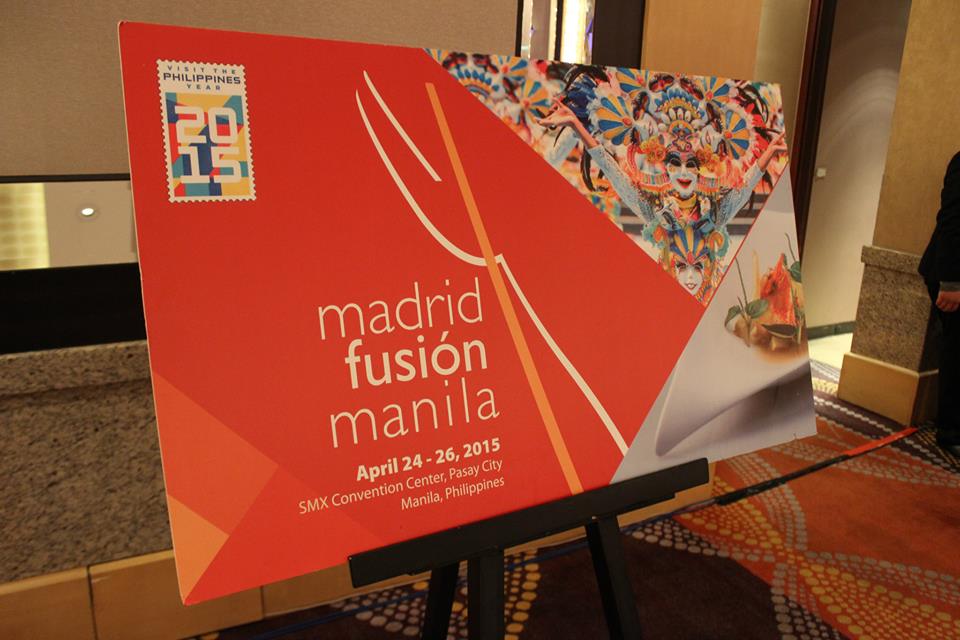
MANILA — If Spain has cheeses, cured meats and olive oil, the Philippines, through the Department of Agriculture (DA), also has a list of top Philippine food and agricultural products that will take the spotlight during the prestigious international gastronomy event–Madrid Fusión Manila.
Spain’s most important food congress, will debut in Asia, on April 24−26, 2015 at the Mall of Asia’s SMX Convention Center in Pasay City.
DA Undersecretary for Special Concerns Berna Romulo-Puyat said that Madrid Fusión Manila, which will feature some of the most renowned chefs from Spain and other parts of the globe, would be a good opportunity for the Philippines to highlight and promote the best of Philippine food and top agricultural products.
She said that participants in the congress will learn the latest culinary trends and techniques from the most influential and avant-garde chefs from Spain, the Philippines and other countries in Asia as they talk about progressive gastronomy, technological innovation, and revolutionary techniques in cuisine.
The global event also aims to showcase an encounter between Spanish and Filipino chefs to celebrate over 300 years of shared history.
“With our participation in the Madrid Fusión, we also take the opportunity to introduce Filipino food, which the agency has carefully selected, that foreign markets may find interesting and hence, will have export potential,” Puyat said.
The DA will exhibit a wide array of Philippine’s agricultural products from current top exports, to the so-called rising stars — rediscovered indigenous foods and processed foods.
The top exports to be exhibited include mango, coconut, banana, pineapple, tuna, cacao and coffee, which are produced mostly through large-scale or corporate farming.
“And as the DA strives to mainstream products from artisanal and smallholder farming, the agency will specially highlight indigenous agricultural products, as well as slow food items in the event,” the agri official said.
Slow food is produced in accordance with indigenous culinary traditions using the highest quality of local ingredients.
Among the slow food ingredients DA will showcase are the so-called “rising stars” such as heirloom rice, calamansi (Philippine lime), sampaloc (tamarind), suha (also pomelo of the citrus family), pili nuts (Canarium ovatum, endemic in the Bicol region), siling labuyo (wild chili) and dalandan (Citrus aurantium).
Also in the DA’s list are the rediscovered Filipino indigenous foods such as adlai (Coxlacryma jobi, a minor cereal crop planted usually by indigenous peoples), kamias (Averhhoa bilimbi, a fruit used as souring ingredient), batuan/batwan (Garcinia binucao, a fruit used as souring ingredient in western Visayas) tabon-tabon (Atuna racemosa, a plant endemic in northern Mindanao) and sua (Citrus hystix, a plant endemic in Mindanao).
Completing the assortment of Philippine indigenous and slow food products are muscovado sugar (unrefined molasses sugar), dalandan liquor, calamansi liquor, Davao’s malagos cheese, Philippine Carabao Center’s kesong puti, and various types of suka (vinegar) such as sukang Paombong (nipa palm vinegar), sukang tuba (coconut sap vinegar), sukang Iloco (Ilocos cane vinegar), Pinakurat (spiced vinegar from Iligan City, Lanao) and Sinamak (spiced vinegar from Iloilo).
Meanwhile, Agriculture Secretary Proceso Alcala said that as the country integrates in the bigger ASEAN market and subsequently the larger international market, the Madrid Fusión is an opportune venue to introduce the Philippine’s best agricultural produce and food products to gastronomy enthusiasts and prospective international buyers.
“Now that sustainable lifestyle and fair trade are the trend, more people will want to consume slow food and food ingredients from small farmers and those that are produced using indigenous traditions.
Madrid Fusión will help us mainstream both our local products and our advocacy to patronize these,” Alcala said.